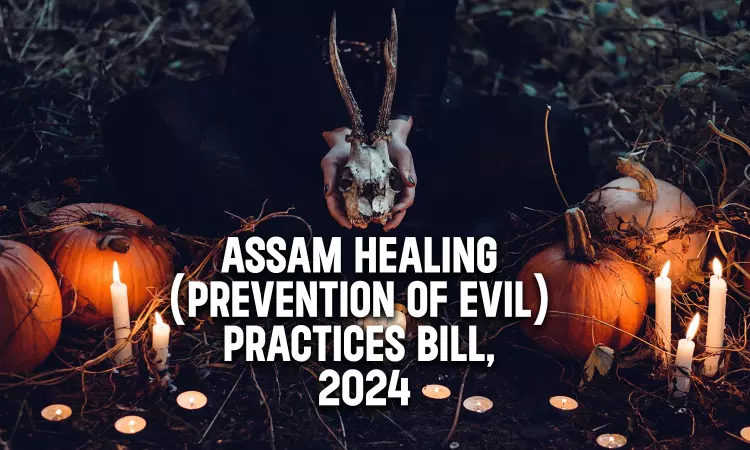The Assam Assembly has passed the Assam Healing (Prevention of Evil) Practices Bill, 2024.
The Bill was approved by voice vote on February 26, 2024 within five days of its introduction in the 126-member State Assembly. It was tabled by Parliamentary Affairs Minister Pijush Hazarika on February 21, on behalf of State Chief Minister Himanta Biswa Sarma.
It is stated that the proposed law aims to curb "evil and sinister" non-scientific healing practices carried out to exploit innocent individuals and to bring a "social awakening" in the society.
 |
| snap: Livelaw.com |
Definition clauses:
The Bill defines "evil practices" as commission of any act of healing practices and magical healing by any person with a "sinister motive" to exploit common people.
"Healing and healing practices" cover traditional holistic approach to heal body, mind and spirit (of a human) with traditional medicine and art, including "any system, treatment, diagnosis, or practice for ascertainment, cure, relief, correction of any human disease, ailment, deformity, injury or enhancement.
However, on March 1, Nagaland legislators including Ministers and also from BJP opposed the Assam law. They claimed the legislation brought in Assam was against the spirit of secularism.
Given Assam’s significant role as the 'elder brother among the eight states' in the Northeast, and with its chief minister Himanta Biswa Sarma serving as convener of the BJP-led North East Democratic Alliance (NEDA), a former Nagaland CM and now deputy Chief Minister T R Zeliang urged the Assam government to be more accommodating in dealing with different religions in the region.
Zeliang called upon Government of Assam to revoke and abolish the Assam Healing (Prevention of Evil) Practices Bill, 2024, stating the sentiments of the NLA members should be conveyed to the Assam Legislative Assembly.
Zeliang said he opposed the Bill as it directly challenged the principle of secularism in India.
Zeliang claimed that the Assam Healing (Prevention of Evil) Practices Bill, 2024, purportedly aiming to “bring social awakening in the society”, effectively sought to ban healing crusades or healing practices conducted by Christian missionaries in Assam.
He argued that this prohibition went against the principle of secularism enshrined in the country’s constitution. He denounced the characterisation of Christian healing as “magical healing”, asserting that such labelling diminished the spiritual significance of Christian faith and life.
As a citizen of a secular and democratic nation, he sought recognition of divine intervention in religious practices, emphasising respect and protecting religious freedoms for all. He maintained that healing practices were distinct from any form of magical powers commonly associated with magicians or practitioners of witchcraft.
In these healing crusades, he clarified that no individual or group was coerced or forced to participate. Rather, he pointed out that the decision to attend such events was entirely dependent on an individual’s faith and belief.
To illustrate the point, he provided an example of Hindu sadhus and fortune-tellers who roamed around in their religious attire, approaching individuals to persuade them by offering items like precious stones, magic rings, or talismans for longevity and good fortune.
He pointed out that such practices were not prohibited by the Nagaland government or any Christian organisation, but were instead left to individual choice based on their faith and beliefs.
Insisting that no outside authority should have the authority to interfere with the religious decisions of individuals or communities, he accused the Assam government of having violated this right guaranteed to the citizens of India.
He feared the Bill would strip the authority of Christian prayer and healing practitioners and vest it with state actors, which constituted a violation of the rights guaranteed by the constitution.
Three other legislators - Dr Sukhato Sema (LJP-Ram Vilas), NDPP legislator Kudecho Khamo and Nagaland Minister Imna Temjen Along also opposed the Assam law.
The discussion was taken up by the Nagaland assembly under matters of urgent public importance under Rule-50 of the House.
Temjen said: "We would like to make it known that healing is not the subject matter of the priest, the preacher or the evangelist but one is healed by the grace of God".
Section 3 of the proposed law in Assam prohibits "taking part" in healing practices and magical healing propagation for health treatment of any person, which gives a "false impression" that the subject disease, pain or trouble will be cured. Further, Section 4 bars direct or indirect participation in any misleading advertisement wrt any medicine/remedy.
Cognizable & Non-bailable offences: Offences under the law shall be cognizable (arrest without warrant) and non-bailable.
Bar on evil healing practices: As per Section 5, commission of any act of "inhuman, evil or magical healing" or "black magic acts", by a person himself or through another, shall be an offence. The propagation or promotion of said practices shall also be open to punishment.
Penalty: Whoever contravenes the provisions of the law shall, in the first instance, be punishable with imprisonment of 1-3 years, or fine of Rs.50,000 or both. If case of second conviction, punishment may entail imprisonment of upto 5 years, or fine of Rs.1 lac or both.
ends






No comments:
Post a Comment